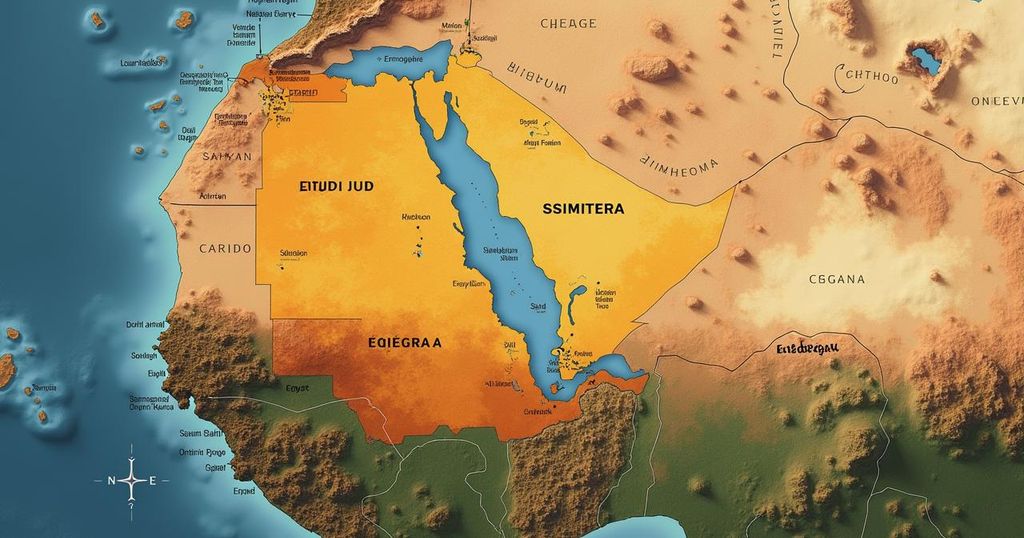Egypt is enhancing its influence in the Horn of Africa through key alliances with Somalia and Eritrea, aimed at countering Ethiopia’s dominance. Following a tripartite summit with the leaders of these nations, Egypt is adopting a more interventionist approach amid rising regional tensions, highlighted by accusations of military involvement in Sudan. Prime Minister Abiy Ahmed has voiced strong opposition to Egypt’s maneuvers, framing them as threats to Ethiopian sovereignty.
Egypt is actively enhancing its strategic position in the Horn of Africa by forming alliances with Somalia and Eritrea. This initiative was underscored by Egyptian President Abdel Fattah Al-Sisi’s participation in a pivotal tripartite summit held in Asmara, where he convened with Eritrean President Isaias Afwerki and Somali President Hassan Sheikh Mohamud. The primary objective of this alliance is to bolster their influence in the region while simultaneously creating a coalition designed to counter Ethiopia’s rising prominence. The timing of the summit is particularly significant, occurring immediately after allegations surfaced from Sudan’s Rapid Support Forces, led by Mohamed Hamdan Dagalo, who accused Egypt of conducting airstrikes against their forces. This confrontation illustrates Egypt’s decisive shift from a previously neutral stance during the ongoing conflict in Sudan to a more direct interventionist policy, aimed at reasserting its role as a dominant regional player that prioritizes its national interests. As regional tensions escalate, the summit’s purported focus was to enhance bilateral relations and address crucial security concerns. Notably, Eritrean officials maintained that discussions were centered on fostering connections between the three nations, but it is widely perceived that the alliance is primarily a strategic maneuver to confront Ethiopian interests. This bilateral cooperation further solidified following Ethiopia’s recent signing of a memorandum with the Somaliland region, granting Ethiopia access to a port and naval base in the vital southern Red Sea. In response, the Egyptian presidency emphasized that the summit was aimed at strengthening ties and addressing regional challenges collaboratively. Ethiopian Prime Minister Abiy Ahmed has vocally opposed Egypt’s expanding influence in the Horn of Africa, asserting, “We will not allow them to harm us; we will humiliate anyone who dares to threaten us.” He emphasized his commitment to Ethiopia’s sovereignty and dignity, indicating his unwillingness to compromise on these issues. Cairo’s military involvement in conflicts across the continent, such as aligning with Sudanese army leader Abdel Fattah al-Burhan while partaking in diplomatic mediation, further highlights its efforts to maintain a critical role in African affairs. Notably, allegations have arisen concerning Egypt’s use of US weaponry, claims Cairo has firmly denied, maintaining its commitment to supporting Sudan’s stability and institutional integrity. In conclusion, Egypt’s recent actions, particularly its alliance with Somalia and Eritrea, represent a strategic recalibration aimed at fortifying its influence in the Horn of Africa amid rising tensions with Ethiopia. By engaging in direct military involvement and navigating complex regional dynamics, Egypt is attempting to assert itself as a key player in addressing the continent’s crises while safeguarding its interests.
The Horn of Africa has become a focal point of geopolitical tension, particularly with the ongoing conflict in Sudan and Ethiopia’s increasing foothold in the region. Egypt’s historical concerns about water security, particularly regarding the Nile River, have driven its engagement with surrounding nations as it seeks to mitigate threats to its interests and influence from Ethiopia. The recent shifts in military alliances and political strategies emphasize the complexity of regional relations and the balancing acts countries must perform in a landscape fraught with insecurity and competing interests.
In summary, Egypt’s recent diplomatic maneuvers, highlighted by the summit with Somalia and Eritrea, illustrate a strategic response to growing pressures from Ethiopia. By solidifying these alliances, Egypt aims to enhance its influence in a tumultuous region while asserting its military presence, indicating a new phase in its engagement with East Africa amidst ongoing conflicts. The developments signify a critical moment in the geopolitical landscape of the Horn of Africa, where longstanding tensions continue to shape relationships and interventions.
Original Source: www.atalayar.com






